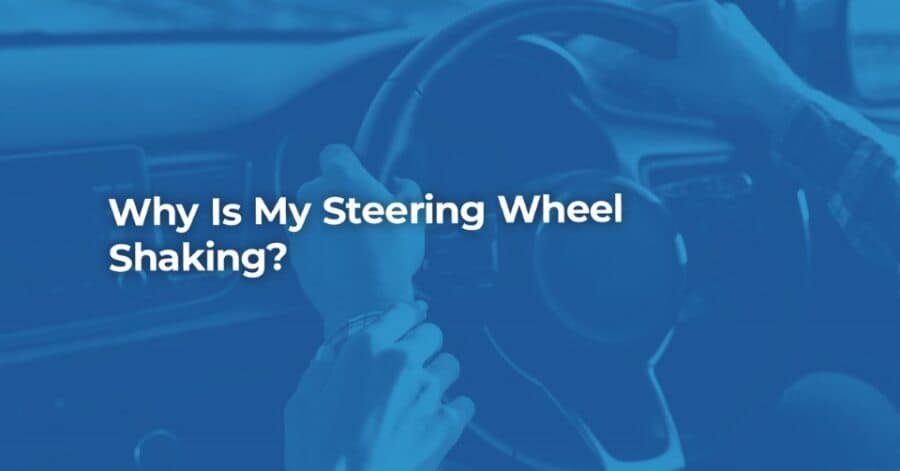If you’ve ever experienced your car’s steering wheel shaking whilst you're driving, then you’ll know how worrying this can be.
From tyre problems to brake issues, there are several reasons why your steering wheel might shake.
Read on and find out what could be causing the shaking, how to fix the problem and whether you should keep driving with a shaking steering wheel.
Page Contents
- Why Does My Steering Wheel Shake?
- Why Is My Steering Wheel Vibrating at High Speeds?
- Why Is It Hard to Turn My Steering Wheel?
- Why Does My Steering Wheel Shake When Braking?
- How Can I Fix a Shaking Steering Wheel?
- How Much Does It Cost to Fix a Vibrating Steering Wheel?
- Will This Result in MOT Failure?
- Why Does My Car Pull to the Side?
- Can You Drive with a Shaking Steering Wheel?
- FAQs
Why Does My Steering Wheel Shake?
If your steering wheel is shaking or wobbly, the most likely cause is your front tyres.
When the front tyres wear out unevenly, are out of balance or become damaged, this can cause the steering wheel to shake.
Low tyre pressure could also be to blame, so you should make sure that your tyres are in good condition and are properly inflated.
Why Is My Steering Wheel Vibrating at High Speeds?
Your steering wheel may vibrate at high speeds if your tyres are damaged.
Bulges in the tyre sidewall are a giveaway.
You should have the damaged tyre replaced quickly to avoid a tyre blow-out.
Worn out wheel bearings can also cause the steering wheel to vibrate.
If the steering wheel only shakes when you are cornering, then track rod ends could be the cause.
Ball joints, on the other hand, will only shake while driving straight, and never whilst cornering.
Why Is It Hard to Turn My Steering Wheel?
If your steering wheel is hard to turn, the issue behind this can vary depending on whether your vehicle has an electric power steering (EPS) system or a hydraulic system.
Some of the most common reasons that a steering wheel is hard to turn include:
- Low power steering fluid
- Low tyre pressure
- A damaged serpentine belt
- Steering rack issues
- A faulty power steering pump
Why Does My Steering Wheel Shake When Braking?
If your steering wheel only shakes when you brake, then your vehicle’s brake discs may have warped.
Alternatively, worn or damaged steering or suspension joints could be to blame, as could buckled wheels.
Please note that some newer vehicles are equipped with active lane keeping assistance systems, which may cause the steering wheel to shake when warning the driver of lane departure.
This is not a fault - you can refer to your vehicle’s handbook if you aren’t certain if your vehicle has this feature.
You may also hear a beep or notice a related warning light if this is the cause.
How Can I Fix a Shaking Steering Wheel?
To find out the exact cause of the shaking, you will need to have your vehicle checked by a professional mechanic.
You can help your mechanic understand the cause by making a note of when exactly you experience the vibrations.
For instance, the steering wheel may only vibrate when you drive at high speeds.
If you think that out of balance tyres could be the issue, ensure that these are inflated properly, and see if the shaking continues.
If it does, you should take your car to a mechanic and provide them with the information you’ve gathered.
You should also inspect the condition and pressure of each tyre, as it could be that a tyre replacement is required.
How Much Does It Cost to Fix a Vibrating Steering Wheel?
Given that a range of issues could be to blame, it is difficult to determine the cost of fixing a shaking steering wheel.
A professional mechanic will be able to advise you further.
Will This Result in MOT Failure?
A vibrating steering wheel will not result in an MOT failure.
However, the underlying issue causing problems with the steering wheel – for instance, a problem with the brakes or tyres - might.
You should have your vehicle looked at by a professional mechanic as soon as possible, so that you can reduce the likelihood of your car failing the MOT test.
Why Does My Car Pull to the Side?
If your car is pulling to the side when you let go of the steering wheel, then your wheels may be out of alignment.
When your wheels are properly aligned, this can reduce tyre wear, limit steering problems and even improve fuel economy.
However, if your car pulls to the side when you do something else – besides releasing the steering wheel – then there could be an issue with another component.
For example, if your car pulls when you apply the brakes, then a brake or suspension component could be the issue.
Your car may also veer to one side if the tyre pressure is uneven, if the tyres are worn or if your wheels are imbalanced.
Can You Drive with a Shaking Steering Wheel?
Given that this warning sign could signal an issue with one of your vehicle’s vital components, you should not drive with a shaking steering wheel.
Not to mention that the shaking steering wheel could be distracting on the road.
Better to be on the safe side and have the vehicle fixed before you drive the car again.
FAQs
Why Is My Car Shaking When Driving?
What Happens When Your Car’s Wheel Are Unbalanced?
What About When Driving at Low Speeds?






